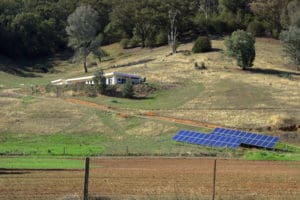 Adventurous homeowners are exploring options to escape being tied down by monthly utility bills and live off the grid. Those with enough land for farming may find they can live reasonably cheaply and leave their traditional 8 to 5 jobs behind. While television shows can make off-the-grid living seem accessible to anyone with enough guts to give it a go, what are the requirements to live this way in Oregon?
Adventurous homeowners are exploring options to escape being tied down by monthly utility bills and live off the grid. Those with enough land for farming may find they can live reasonably cheaply and leave their traditional 8 to 5 jobs behind. While television shows can make off-the-grid living seem accessible to anyone with enough guts to give it a go, what are the requirements to live this way in Oregon?
What are some of the land-use issues that may impact living off-the-grid in Oregon?
- Not all land can be used for building a home. Oregon has stringent zoning laws designed to prevent urban sprawl and protect natural resources. Over half of the state’s land (55%) is zoned for public use, 25% is zoned for farming, and 13% is reserved for forests. While a home may be constructed on forest or farming land, additional requirements must be met for those zoning regulations.
- Property estate taxes can be significant. Because Oregon has no sales tax, the state relies more heavily on property taxes for funding. One strategy homeowners with acreage employ is to transform part of their property into farming or forested land, which is taxed at a much lower rate. To be considered farmland, the parcel size must meet minimum requirements for that area–typically between 20 to 160 acres–and be used for farm-related purposes that generate a set minimum revenue each year. To achieve forested status, the property must meet minimum size requirements and contain enough trees to meet the stocking standards of the Oregon Forest Practices Act.
- Other laws can make everyday necessities challenging. Accessing natural resources on your property like water requires permits, and there may be building codes that apply to the property requiring at least one flush toilet or another approved wastewater treatment system.
- Local laws may restrict mobile homes. Contrary to popular thinking, an RV owner can’t set up on any parcel of property for permanent living. Laws will require the RV to be connected to utilities in many areas, including a wastewater management system. A tiny home without a permanent foundation is often considered an RV and subject to the same rules.
- The home you build will be subject to state building codes. There are many options for off-the-grid dwellings, but Oregon requires more than just four walls and a roof. Any structure you build to live in must comply with building codes such as the Oregon Residential Specialty Code.
If you’re considering living off-the-grid in Oregon, the first step is to understand the land use provisions of the property you have in mind.
If you need more information about the development regulations for your property, contact the professionals at Richard Stevens & Associates. We specialize in assisting our clients with obtaining rural and urban land use planning permits. Our team begins by performing a feasibility and project analysis to determine the best way to reach your land use planning goals. We’ll conduct all the research on legality, concerns, existing conditions, and more to determine which areas need to be addressed in the planning process. Before you invest money in altering or developing your land, give us a call to ensure you’re doing it right.
